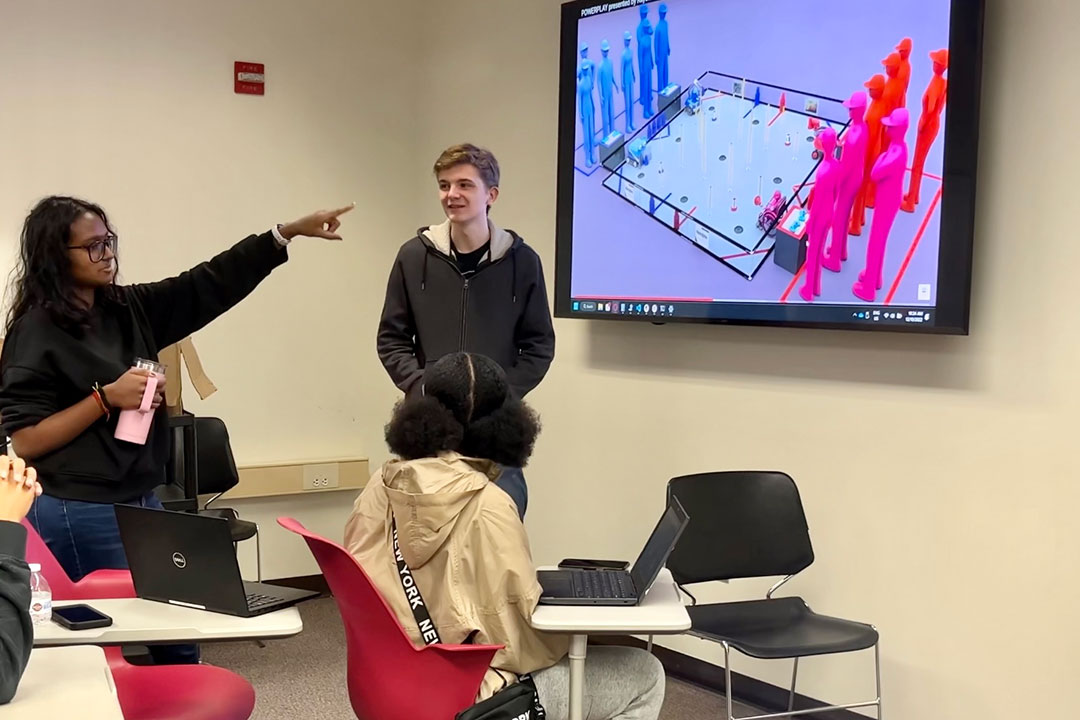STEP scholars work with RIT students for unique connections in STEM
After connecting with nearly 10 campus groups, STEP director says each collaboration brings ‘a new opportunity’ that is mutually beneficial to the programs
Brit Milazzo
RIT students work with STEP scholars during a STEAM Saturday event that provides research and robotics experiences for the participants on weekends throughout the school year. In addition to being facilitated by STEP staff, RIT students are also a big part of working with youth involved in the Science and Technology Entry Program, through RIT’s K-12 University Center, that allows the middle and high school students to engage with aspiring STEM professionals invested in sharing their passions for subjects in science, technology, engineering and math.
Programs like the Science and Technology Entry Program, also known as STEP, are special for Cameron Robinson. As a kid, he was exposed to robotics through a similar program in his hometown at a time when he said he “was struggling.”
“Robotics and engineering gave me a positive and creative outlet that has bettered my life in ways I cannot begin to describe,” he said. “If I can take a few hours out of my day to pay that forward to even one kid, I am more than happy to. The STEP program is a fantastic opportunity, and I am so glad to be a part of it.”
Robinson, a fourth-year software engineering student at Rochester Institute of Technology, has volunteered to work with middle and high school STEP scholars during events like STEAM Saturday that provide research and robotics experiences for students on weekends throughout the school year. The interactive workshops allow participants the opportunity to network, and explore different areas of interest and fields of study, while honing their STEM skills through programs such research and robotics.
But he’s just one of many students among nearly 10 campus groups that have the chance to work with local youth through RIT STEP.
“Each collaboration provides a new opportunity for the STEP scholars to experience,” said STEP Director Ashley Simmons.
Some groups the program works with include:
- Alpha Chi Sigma, RIT’s professional coeducational chemistry fraternity
- Collegiate Science and Technology Entry Program (CSTEP)
- Computing Organization for Multicultural Students (COMS)
- CyberCorps Scholarship for Service
- RIT Chapter of the National Society of Black Engineers (NSBE)
- RIT Chapter of the Society of Hispanic Professional Engineers (SHPE)
- Robotics Club at RIT
“It provides opportunities for STEP scholars to work with RIT college students, while learning and growing from one another,” Simmons said. “It promotes a college-going environment. The STEP scholars learn firsthand what it’s like to be in various majors (and) programs, especially at RIT. (They) receive new perspectives, peer-to-peer mentorship and networking, and helps build confidence. RIT student groups have a wide (and) diverse skillset, and looking forward to collaborating with more groups on campus to continue expanding their horizons and desires to pursue college and/or careers in STEM and/or license professions.”
STEP is administered by RIT’s K-12 University Center as one of dozens of locations across the state. As a state-funded precollegiate initiative, it provides outreach for seventh- through 12th-grade students who are underrepresented or from low-income families, and interested in pursuing STEM professions. The goal is to provide afterschool and weekend enrichment activities to help foster academic development, and so students can successfully transition from middle school to high school and high school to college or the workforce.
The collaboration process, Simmons added, is a constant connection through networking and meetings to discuss objectives, set activity and event dates, and learn how the programs can be mutually beneficial.
Robinson said he learned about STEP and its Saturday programming at a meeting with RIT's Multidisciplinary Robotics Club.
“Ashley came to one of our meetings because they were having issues with one of their robots and needed help,” he said. “I had worked in similar robotics programs in high school, so I offered to help out. While I worked on troubleshooting their bot, I asked questions about their program and was excited to find out they had opportunities to mentor students. I had previously worked in similar programs and found them very rewarding, so I offered to start coming to their meetings the very next week.”
Robinson facilitates discussions, helps demonstrate good engineering practices and brings a lengthy background in FIRST STEM Programs, which STEP scholars participate in through robotics. This school year, STEP’s FIRST LEGO League team (#39581, Triple Cs: Crazy, Creative and Cool) advanced to the FLL competition next month in Buffalo. They were also given the Core Values Award, and STEP Outreach Specialist Dana Storti received the Coach/Mentor Award.


